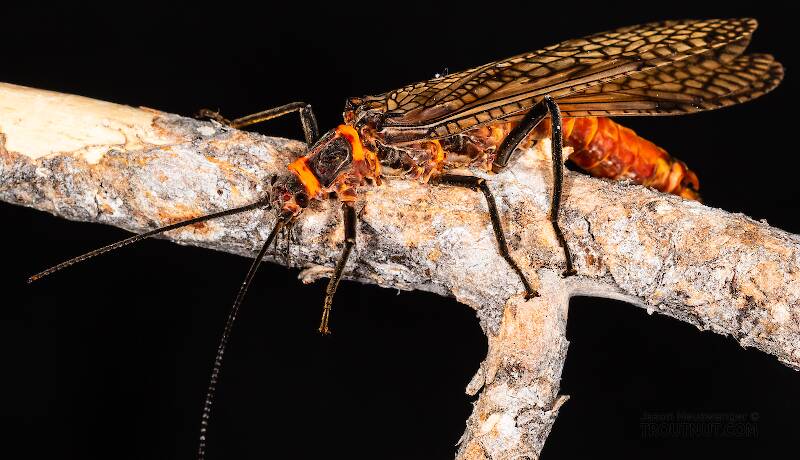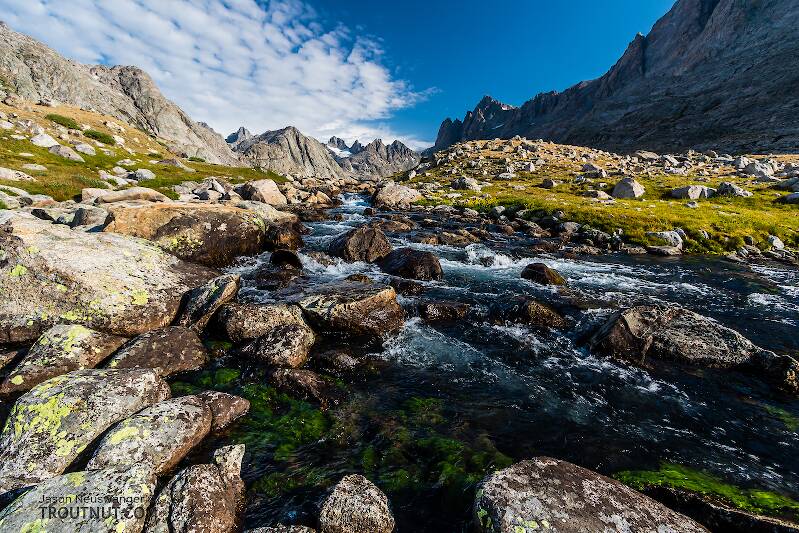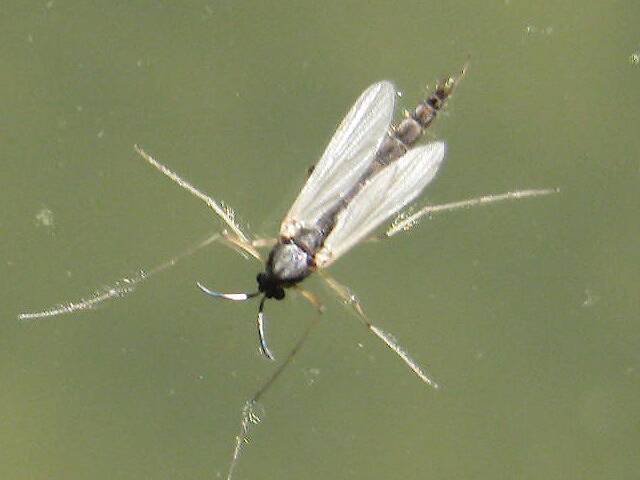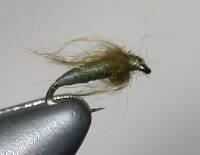
Salmonflies
Pteronarcys californica
The giant Salmonflies of the Western mountains are legendary for their proclivity to elicit consistent dry-fly action and ferocious strikes.
Featured on the forum

Troutnut is a project started in 2003 by salmonid ecologist Jason "Troutnut" Neuswanger to help anglers and
fly tyers unabashedly embrace the entomological side of the sport. Learn more about Troutnut or
support the project for an enhanced experience here.
Martinlf on Apr 13, 2008April 13th, 2008, 11:53 pm EDT
Having religiously avoided lead wire for years, I've recently been considering using it again for selected applications. But I'm still somewhat reluctant. I've heard arguments to the effect that lead is not water soluble, and that in flies that break off it is not apt to be ingested by waterfowl. There may be other factors to consider. If there is little or no real risk, it seems unreasonable to forgo use of a material that may be effective.
Realizing that two environmentally-minded chemists who tie flies could possibly come down on different sides of this issue, I'd still especially like to hear others' thoughts on this, especially those of people who have some scientific knowledge about the physical variables involved.
I'll also add that I'm exploring the use of tungsten beads, lead free wire, and tungsten wire in different combinations to achieve the weight needed in flies like the Vladi worm (condom fly) featured in the Walt's Worm thread. If tungsten wire is too stiff to wrap, multiple sections might be bound to a hook lengthwise instead, and this might have the advantage of putting the weight where it would best invert a hook, if a hook up (or down, I suppose) style is desired.
Realizing that two environmentally-minded chemists who tie flies could possibly come down on different sides of this issue, I'd still especially like to hear others' thoughts on this, especially those of people who have some scientific knowledge about the physical variables involved.
I'll also add that I'm exploring the use of tungsten beads, lead free wire, and tungsten wire in different combinations to achieve the weight needed in flies like the Vladi worm (condom fly) featured in the Walt's Worm thread. If tungsten wire is too stiff to wrap, multiple sections might be bound to a hook lengthwise instead, and this might have the advantage of putting the weight where it would best invert a hook, if a hook up (or down, I suppose) style is desired.
"He spread them a yard and a half. 'And every one that got away is this big.'"
--Fred Chappell
--Fred Chappell
Mtskibum on Apr 14, 2008April 14th, 2008, 6:36 am EDT
I cant answer your other questions, but lead is not water soluble. It wont rust in water.
Falsifly on Apr 14, 2008April 14th, 2008, 7:32 am EDT
FYI- Rust is a term used more properly with the corrosion of ferrous metals (those containing iron) and is another term for iron oxide. Oxidation being the process by which it forms. Lead oxidizes into lead oxide thus the white powder. To my knowledge lead will not dissolve in water but I wouldn’t stake my life on it. It has been banned for use in plumbing.
Falsifly
When asked what I just caught that monster on I showed him. He put on his magnifiers and said, "I can't believe they can see that."
When asked what I just caught that monster on I showed him. He put on his magnifiers and said, "I can't believe they can see that."
Shawnny3 on Apr 14, 2008April 14th, 2008, 1:03 pm EDT
I won't add much new, just confirm what's been said. Metallic lead is quite insoluble, as Mtskibum says, and resists oxidation. It probably oxidizes to a small degree, though, because of the white salt coating one often finds on it (I'm guessing some combination of lead oxides and lead carbonate). Now, whether all the lead left behind from fishermen actually has a measurable effect on stream ecology beyond natural levels, I don't know. But I wouldn't want to be drinking water, as Falsifly states, that has been in prolonged contact with lead. As with most things, its the dose that would determine how deleterious it was. But heavy metals have a way of concentrating as they progress through the food chain, and that's probably reason enough to avoid using it on the stream.
It would be interesting to hear some stream ecologists comment on this. Now that I think of it, I have some stream analysis data from the acid runoff into Buffalo Run from the I-99 construction debacle. If I think of it I'll check to see what kind of lead numbers they were getting both before and after exposing the stream to tremendous mineral levels.
-Shawn
P.S. I don't know how other people use the term, but I use the term rusting in a very general sense with my students, using it interchangeably with the term oxidizing. I want them to realize that the most commonly mentioned oxidization reaction (the rusting of iron) is fundamentally identical to thousands of other reactions - there's nothing special about it chemically speaking. If they leave my class knowing that "all metals can rust if they lose electrons," then I'm happy.
P.P.S. And shame on you, Louis, for making us chemistry types work while we're trying to surf a fishing website. I would requite by posting an essay on Chaucer for you to critique, but I don't think I could do that to myself.
It would be interesting to hear some stream ecologists comment on this. Now that I think of it, I have some stream analysis data from the acid runoff into Buffalo Run from the I-99 construction debacle. If I think of it I'll check to see what kind of lead numbers they were getting both before and after exposing the stream to tremendous mineral levels.
-Shawn
P.S. I don't know how other people use the term, but I use the term rusting in a very general sense with my students, using it interchangeably with the term oxidizing. I want them to realize that the most commonly mentioned oxidization reaction (the rusting of iron) is fundamentally identical to thousands of other reactions - there's nothing special about it chemically speaking. If they leave my class knowing that "all metals can rust if they lose electrons," then I'm happy.
P.P.S. And shame on you, Louis, for making us chemistry types work while we're trying to surf a fishing website. I would requite by posting an essay on Chaucer for you to critique, but I don't think I could do that to myself.
Jewelry-Quality Artistic Salmon Flies, by Shawn Davis
www.davisflydesigns.com
www.davisflydesigns.com
Martinlf on Apr 14, 2008April 14th, 2008, 1:48 pm EDT
Shawn, I'll be more than happy to dig into anything you post up on Chaucer if you can get some hard information from some stream ecologists on this topic.
"He spread them a yard and a half. 'And every one that got away is this big.'"
--Fred Chappell
--Fred Chappell
Quick Reply
Related Discussions
Topic
Replies
Last Reply
2
Jul 5, 2007
by Shawnny3
by Shawnny3
1
Jul 28, 2006
by Wiflyfisher
by Wiflyfisher







